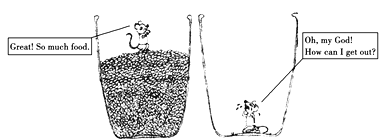题目内容
【题目】假定英语课上老师要求同桌之间交换修改作文,请你修改你同桌写的以下作文。文中共有10处语言错误,每句中最多有两处。错误涉及一个单词的增加、删除或修改。
增加:在缺词处加一个漏字符号(∧),并在其下面写出该加的词。
删除:把多余的词用斜线(\)划掉。
修改:在错的词下划一横线,并在该词下面写出修改后的词。
注意:1.每处错误及其修改均仅限一词;
2.只允许修改10处,多者(从第11处起)不计分。
I don’t remember exact how old I was when I began to ride a bike. I only remembered how I practiced riding a bike in early years. When I first successfully rode a bike, that remains a vivid memory, my brother helped me with holding the back seat of the bike while I was riding. “Wow, I did it!”, cried I, as soon as he noticed I was riding without his hands hold it! I learnt quickly, and soon, even though my feet were not touching the ground, but I was able to cycle around six kilometer a day to school! It’s so lovely to remember which happened at that time.
【答案】
【解析】考查副词。修饰动词remember,用副词,所以exact改成exactly。
考查时态。表示主语现在的状态,用一般现在时,所以remembered改成 remember。
考查代词。我只记得在我早年,我是如何练习骑自行车的。表示“我的”,所以early前加my。
考查非限制性定语从句。which remains a vivid memory作定语,修饰整个句子,所以which remains a vivid memory是一个非限制性定语从句,关系词在从句中作主语,所以用which,that不能引导非限制性定语从句,所以that改成which。
考查介词。我骑自行车时,我哥哥通过握着车后座来帮助我。表示“通过”,所以with改成by。
考查代词。我注意到了我骑自行车的时候,他没有握着后座。表示“我注意到”,所以he改成I。
考查v+ing。介词之后,用v+ing。所以hold改成holding。
考查连词。即使我的脚碰不到地面,我也能每天骑六千米到学校。even though与but不能连用,所以去掉but。
考查名词单复数。被six修饰,所以用名词复数,kilometer改成 kilometers。
考查宾语从句。what happened at that time.作remember的宾语,所以what happened at that time.是一个宾语从句,引导词在从句中作主语,which表示“哪一个”,而what表示“什么”,所以which改成what。




